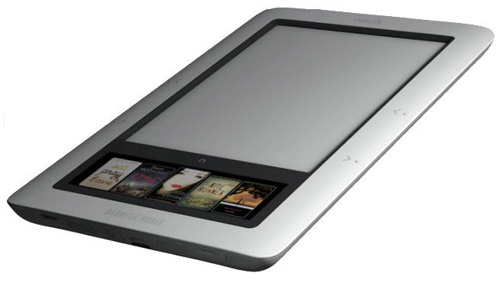Congratulations B&N, you've built my Kindroid. So now what?


The Barnes and Noble "Nook", which was launched earlier this month, is the real-life version of the "Kindroid" I envisioned one year ago. So now that it has been built for real, what do we do with it?
A year ago, I posited that Amazon might do better with the Kindle platform if they abandoned their proprietary, locked down software platform on the device and embraced an Open Source platform, Google's Android.
It never occurred to me that the Kindroid might actually become reality in the near future, and that the theoretical device would be introduced by Barnes & Noble, Amazon's prime competition in the brick and mortar space. Still, I am impressed and somewhat vindicated that the Kindroid or a similar device that resembled my proposed configuration came into existence as the Nook.
Click on the "Read the rest of this entry" link below for more.
So now that we have a real life Kindroid -- what do we do with it?
My actual Kindroid is more than just the sum of its parts. To truly make use of the technology, we need to consider what the benefit there is to having Android on an e-reader if the developers can't get get access to it.
I suspect that Android was chosen because B&N doesn't want to be in the business of developing its own software platform for its reader, which is one of the prime reasons I suggested that Amazon go the same route a year ago. However Android also has the benefit of having its own software development community, and would allow a great deal of extensibility to be added to the device if a Nook Developer Kit with a "Nook App Store" was opened up that allowed modified Android applications to run on the device.
Also Read:What does the Nook need to be Ed Tech's e-book holy grail?
With my original proposed "Kindroid" I suggested that the reference design be opened up to any company that wanted to build a compatible device. Well, all that would be needed in this case would be for B&N to release its Nook software stack for Android into an OSI-approved Open Source license. That would allow every Android device in the wild to read Nook content. This could be beneficial to those of us that might already own e-readers such as the SONY, or may intend to buy a Nook as well as an Android smartphone, such as the Verizon DROID, which would allow us to exchange data and content between those systems.The B&N bookstore itself already appears to be device agnostic, in that B&N's e-books look like they will work on multiple e-reader platforms that support Adobe DRM and EPUB, such as the SONY e-book readers. In theory, this should also mean that books purchased from Powell's, Coolerbooks.com and other online e-book sources should also work on the Nook, as well as any number of DRM-free EPUB books, such as the ones from Google's massive Google Books database.
Opening Nook's software stack and creating a Nook developer program/community has tremendous possibilities. A lot of what is needed is already in place, as the device itself runs on Android and an existing Android developer kit is already provided by Google. However, the types of applications that Nook would excel at would be related to its primary e-reader function, so the initial apps I see are integration with social media such as FaceBook, Twitter, and other web-related "Mashup" content.
For example, online book clubs could be created on FaceBook for particular authors and genres. I happen to be a big fan of the Sci-Fi authors John Scalzi, Robert J. Sawyer and Charles Stross. Ideally, I would like to see an application that is able to inventory all of my favorite authors on my reader or in my online Barnes & Noble account, and then show me a list of resources on web sites, FaceBook, Twitter, or Google Wave that reference those authors, with applications/web views that could run on the device. Perhaps allow readers to even interact with the authors themselves. With a Developer Kit, there'd be "An app for that".
We could also have the ability to link up like-minded readers on Google Talk, AIM, and Yahoo Messenger thru some sort of cloud-based amalgamation/data federation mechanism. Perhaps even go as far to allow me to turn on "Public commentary" on my books when I am reading them, so I can see notes from other readers when they are reading various chapters and passages. With a Nook Developer Kit, the applications that community developers could come up with are unlimited. Applications that Barnes & Noble would be hard pressed to design themselves, or even envision entirely.
Does the Nook have the potential to be the ultimate content mashup device? Talk Back and Let Me Know.